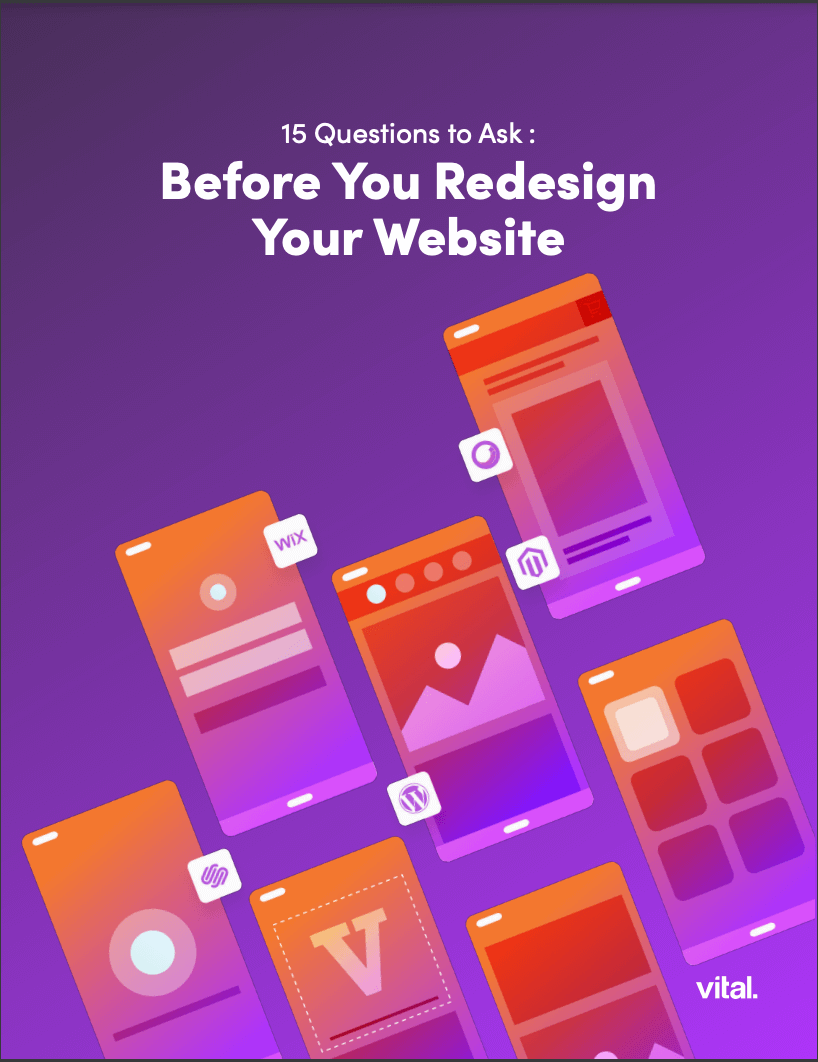Looking for the best digital agency to help with web design or digital marketing? If so, then it’s probably time you construct a meticulously detailed inbound marketing, SEO or website RFP outlining the project’s parameters and expectations and then send the web RFP out to a half-dozen or more digital agencies, right? Wrong. Turns out old-fashioned website requests for proposals (RFPs) are not the most effective way to connect with the agencies you are looking for.
DISCLAIMER: Vital wrote a post — How To Write a Website Design RFP — that went straight to the top of the search engine rankings. The step-by-step guide on how to create a website design RFP, included a downloadable RFP template. The post has proven incredibly popular, ranking among the top three results for dozens of keywords surrounding the RFP query, and the template has been downloaded thousands of times. But while this post has done its job, introducing us to tons of leads and serving as a resource to institutions and non-profits required to follow an RFP process: The RFP process is no way to engage a digital agency if you aren’t required to. The primary reason is simple: In general, the best web design and digital marketing agencies don’t accept or respond to website RFPs.
But before we get into the reasons RFPs don’t work, it’s important to ask yourself one very important question first:
Are You Looking for a Partner or a Vendor in Your Agency Relationship?
We’d argue a client/agency relationship should always be a partnership. So why start the relationship like you’re looking for a vendor ? This is exactly what an RFP does.
No matter how buttoned up the RFP, you’ll never get an apples to apples comparison, you can’t commoditize marketing. A vendor relationship is fine if you plan on firing your agency the second you hit bumps in the road, but we all know that’s not how it works. An agency relationship is much more intertwined than this — because getting into and out of an agency relationship is an incredibly involved process. It’s a lot like an employee relationship, with so much invested and so much at stake you are forced to work on the issues until they’re resolved or exhausted. This is why you should be looking for a partner, someone you can work with, not just a price and a product.
To follow the employee analogy, you would never hire an employee based on their resume alone. The resume is just the starting point in the hiring process and the easiest part to misinterpret. The meat of the hiring process is an intimate process where you test experience and assess personality through a series of in-person and phone interviews. You might be thinking an agency’s response to your RFP is their resume, but in truth an agency’s resume is online, in the form of a comprehensive website with a portfolio, client list, technology proficiencies, team section, etc. If it isn’t, why would you even be considering them.
Of course you already know this, it’s likely how you were going to narrow down your RFP list anyways right? So essentially you are selecting agencies because of their website, then instead of progressing to the more intimate steps, you are wasting essential time and effort from both sides, asking them to rewrite a customized version of their website. Is this a good use of either parties time? When you are buying something do you really want more marketing copy and jargon from whoever is selling it? Or do you want customer reviews, samples, test drives, unboxing videos, friends recommendations etc? Our recommendation, let the agency’s website be their RFP, pass it around to key stakeholders, if it passes muster…then move on to the more personal steps. Not only will this reflect better on your company, but it will get you better results. After all, you may be able to get a desperate agency to participate in these reindeer RFP games, but the successful ones, the sought-after ones are expecting a more evolved process that allows their uniqueness and experience to flourish.
Could you imagine if Burger King asked 13-time Agency of the Year award-winner Crispin, Porter and Bogusky for an RFP? Could you fathom Coca-Cola and Budweiser asking Ogilvy and Mather for an RFP?
It wouldn’t happen and they wouldn’t participate.
So if after reading all of this you’re still thinking: How will I get an idea of price, how will I get references and where will I get examples of their work? The answer is simple: Suck it up and ask for what you need — but don’t send out an RFP. And if it all comes down to money anyways, most agencies should be able to get you in the ballpark but a final price can’t be determined until a formal discovery process has taken place and that’s something you will likely have to pay for anyways.
So now that we have that out of the way, here’s why some of the top digital marketing agencies have determined it’s not worth the headache to respond to RFPs, and most importantly — why it likely is a gigantic waste of your time anyways.
Marketing RFPs Restrict Creativity
Whether it’s a Website RFP, an SEO RFP or an Inbound Marketing RFP, they put forth a tight set of parameters and specifications which end up inhibiting, even dumbing down, an agency’s ability to infuse maximum creativity into its proposal.
If you’re looking for an agency whose specialty involves listening closely to your company’s needs and challenges and then coming up with creative, innovative solutions, it probably doesn’t make sense to reign in that brainpower by putting unnecessary limits on the conversation before it even begins.
The more specifications and restrictions you build in to the process, the less freedom the agencies have to explore all the possibilities, including (or especially) those you may not have considered.
The best agencies know they need to develop a deeper understanding of your “problem” before they start telling you how they are going to “solve” it.
Beware of Marketing RFP Regurgitation
The more specs and details you pack into your website design RFP, the more you run the risk of receiving long-winded, cookie-cutter proposals that may make it harder, not easier, to pinpoint which agency is best for the job.
The last thing you want is to waste time reviewing similar-sounding proposals from agencies that — hamstrung by the need to dot every “i” and cross every “t” in the RFP — end up delivering proposals that simply echo (or even elegantly regurgitate) all the key talking points they think the potential client wishes to hear.
RFPs = Zero Personality
In any professional relationship, personalities are invariably part of the equation. Marketing RFPs, almost by definition, are profoundly impersonal.
Specs and deliverables aside, the partnership between a digital agency and a client is also about relationships, and the text-only RFP removes personality from the mix. If it later turns out that the personality piece is not a good fit, both sides will have wasted each other’s time.
Given this, consider the benefits of having your initial contact in a potential business relationship take the form of an exploratory conversation rather than a black-and-white, boilerplate-sounding document.
Clients Come First … Not RFPs
As you would hope and expect, the best agencies are laser-focused on serving their existing clients.
In addition to constraining creativity, responding to RFPs is also time consuming. In the eyes of some agencies, this represents valuable hours drained from their core mission: working hard for the clients who are investing in their expertise and entrusting them to deliver results.
Are You Ready For an RFP Bidding War?
If the goal is to get the job done by the cheapest company rather than the best, the web design RFP process may still be the way to go.
But if the goal is to find the best agency for the important work you need to accomplish, the smallest dollar figure generally is not the most useful determinant of that.
The bidding war method will succeed in identifying the lowest-priced competitor, but ultimately shortchanges the process.
John Warrillow, a consultant who counsels companies on how to build the value of their business, cautions against going after RFP work in an article on Inc.com.
“RFPs dilute your differentiation,” said Warrillow. “Responding means you are agreeing to be shoved into a box with a bunch of half-rate competitors who compete on price. You’re better than that.”
Tough words, but it stands to reason that the smartest agencies prefer to have meaningful discussions with a potential client — to more fully understand your unique needs and challenges, key problems and specific goals — before they invest the time and resources needed prepare a comprehensive, customized proposal for services.
The RFP Disruption Dilemma
Some agencies actually consider it to be contrary to their own carefully developed best practices to rough out a proposal for potential clients before performing the due diligence necessary to fully understand the most essential challenges and opportunities they are facing.
Warrillow’s strongly worded warning to agency leadership is that this can also communicate a confusing message to key players within the agency.
“Your staff will scramble around pricing the job, writing prose and giving away your intellectual property,” he said. “They’ll wonder why you don’t have the stones to stick to your business model and why you are willing to let a customer manipulate you like a marionette.”
In short, an agency scrambling to respond to your website design or marketing RFP under a predetermined deadline may not be able to give their proposal the due diligence your company deserves.
Why You Should Consider Ditching the RFP Process and Dig a Little Deeper
OK, so perhaps you agree it makes sense to think outside the RFP.
Perhaps you think you owe it your brand to ditch the bland, procurement-style process and take a more innovative approach.
This begins with doing some smart legwork on the agencies you are considering. Here are a few actionable tips that can help you find the best agency around — without having to go through the RFP process:
- Go online and take a closer look at their websites. Examine their case studies to learn more about how they’ve solved problems for other clients.
- Call several of those clients to gain further insights into an agency’s perceived strengths and weaknesses; its methods, professionalism and personality; its ability to meet deadlines and deliver the expected results in a timely fashion; its capacity to surprise and delight.
This is a more effective way to begin narrowing your search than issuing an — at best ineffective and at worst counter-productive — black-and-white RFP.
Meanwhile, it is equally important to make sure you challenge yourself to develop a clear, concise message about the problems you are trying to solve and the goals you are hoping to achieve.
If your aim is to create a more vibrant, user-friendly website that promotes your brand and enhances the user experience while creating a smart marketing platform custom-designed to attract more visitors, convert them into leads and then convert those leads into customers, be prepared to communicate that message.
Then you’ll be much better prepared to open a line of communication with those select few agencies you’ve decided may have what it takes to help you both shape and achieve your vision.
When you ditch the RFP process and adopt this savvier path to finding a top agency, your bottom line will thank you. Feel free to contact us with any questions regarding our experience in the web design and marketing RFP realm, we’re always happy to talk shop!






